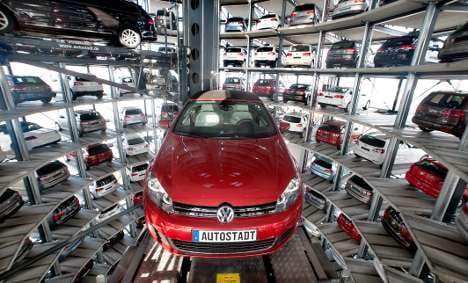The VW statement underscored “sustained high demand in China, India, Central and Eastern Europe, and North and South America” as the main drivers behind its strong results.
It quoted finance director Dieter Pötsch as saying: “Our sound finances and continuous improvements in profitability are the basis for the Volkswagen group’s successful future.”
The group, which owns nine brands, hit the gas as it races to become the world’s biggest auto manufacturer taking on the likes of Toyota, posting a first-quarter net profit of €1.71 billion ($2.5 billion). The comparable figure for 2010 was €473 million.
Chairman Martin Winterkorn, who has boosted VW’s fortunes since he took over in 2007, said in a statement that it would stay in the fast lane throughout 2011, convincing investors who snapped up VW shares in midday Frankfurt trading.
Analysts polled by Dow Jones Newswires had expected a stronger net profit of €1.84 billion, but Anita Paluch at ETX Capital said VW was still “seen as the most attractive company in the sector thanks to its potential, positioning in China and competent management.”
First-quarter operating profit came in at €2.9 billion, a relatively modest gain from the €2.1 billion figure a year earlier.
As for sales, the VW group, which owns brands including Audi, Seat and Skoda, reported a 14-percent increase in terms of the number of vehicles and a jump of 30.8 percent in value terms to €37.5 billion.
Volkswagen also plans to integrate Porsche among its stable of thoroughbred brands alongside Bentley, Bugatti and Lamborghini, but must wait until Porsche has settled legal issues arising from its aborted attempt to buy VW in 2008.
The group’s auto division was sitting on a cash pile worth €19.6 billion at the end of the first quarter, which Pötsch stressed was “not an end in itself.”
He said that “rather, it provides us with the financial flexibility we need for our investments,” and to reach the goal of overtaking General Motors and Toyota to become the leading global car maker by 2018.
With respect to 2011, Winterkorn added: “Volkswagen shifted into the fast lane in 2010 and that’s exactly where we intend to stay this year.”
The group reiterated that still expects sales and operating profit to surpass the 2010 figures of €126.9 billion and €7.1 billion, respectively.
In midday trading, VW shares showed a gain of 4.56 percent to €126.20, far and away the biggest gainer on the DAX index of German blue chips, which was just 0.88 percent higher overall.
AFP/mry



 Please whitelist us to continue reading.
Please whitelist us to continue reading.
Member comments